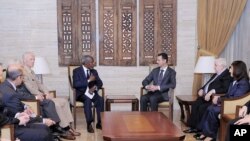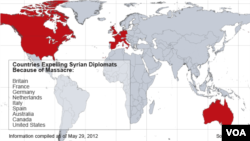With deaths mounting and the West expelling Syrian diplomats, international peace envoy Kofi Annan told Syrian President Bashar al-Assad that the U.N.'s six-point peace plan needs efforts to propel it forward.
"I appealed to him for bold steps now - not tomorrow, now - to create momentum for the implementation of the plan," the U.N. special envoy told reporters in Damascus Tuesday.
Annan also said he conveyed to Assad the international community's concern about the bloodshed, including the massacre in Houla on May 25 of more than 100 men, women and children. He said the Syrian president also condemned the killings.
The U.N. reported Tuesday that its monitors found fewer than 20 of those killed in Houla were struck by artillery and tank fire. It said witnesses told the observers that most victims were killed in their homes in two waves of summary executions by pro-government militiamen.
"Part of the victims had been killed by artillery shells. Now that points ever so clearly to the responsibility of the government," U.N. peacekeeping chief Herve Ladsous told reporters in New York. "Only the government has heavy weapons, has tanks, has howitzers."
Syrian Diplomats Expelled
Nine nations have ordered Syrian diplomats to leave in protest of the Houla massacre.
Expulsion announcements came from France, the United States, Australia, Britain, Germany, Italy, Spain, the Netherlands and Canada.
"We are confident that our clear and firm message does not fall on deaf ears in Damascus," German Foreign Minister Guido Westerwelle said.
The United States has given Syria's top diplomat in Washington, charge d'affaires Zuheir Jabbour, 72 hours to leave the country.
"We hold the Syrian government responsible for this slaughter of innocent lives," U.S. State Department spokeswoman Victoria Nuland said. "This massacre is the most unambiguous indictment to date of the Syrian government’s flagrant violations of its U.N. Security Council obligations."
Syrian Government Denial
Syrian Deputy Foreign Minister Faisal al-Miqdad said Tuesday after meeting Mr. Annan that Syria has not committed any cease-fire violations.
"We offered all that was necessary for the members of the [U.N.] mission to accomplish their job without any obstacles," he said. "The most important thing to be mentioned is that Syria, during this time, has not committed a single violation of Annan's plan nor the preliminary understanding signed between Syria and the United Nations."
The Syrian government denies any role in the Houla killings and blames them on "armed terrorists" whom it accuses of driving a 15-month revolt against Assad.
U.N. observers continue to investigate last week's massacre. U.N. spokeswoman Sausan Ghosheh said that U.N. observers have remained in Houla since Saturday and have been talking to residents.
One U.N. observer, who met with survivors of the Houla killings, expressed frustration.
"It's been quite a difficult meeting because people are very emotional. There's a lot of things that are going out here and everybody has a story to tell of some suffering." the observer said.
Timor Goksel, a former spokesman for U.N. peacekeeping troops in Lebanon, said the massacre could lead to criticism of U.N. observers in Syria trying to stop the violence.
"It's a very nasty event and it certainly makes a mockery of Annan's plan," Goksel said. "But, there is no plan B on the table, still. Nobody else has an option. The military intervention is not an option. So, if there is no other plan, you have to go with something, and you go with this. It was a well-meaning initiative, but it didn't work."
On Tuesday, Syrian government forces continued to attack a number of towns and cities, despite the flurry of diplomatic outrage. Syrian rights activists said at least 19 people were killed across Syria in new attacks related to the uprising.
Annan mediated a cease-fire between government and rebel forces last month, but it has failed to hold.
The special envoy also met with Syrian tribal leaders in Damascus Tuesday. Sheik Walid al-Sahu of the al-Roqeibat tribe told reporters that Syria is becoming more unstable.
"The implementation of his [Kofi Annan's] plan does not exist on the ground. We are witnessing more explosions and kidnappings," al-Sahu said.
Russia's Foreign Minister Sergey Lavrov suggested Tuesday that some countries could end up disrupting the implementation of Annan's peace plan.
"Certain countries, as if the Security Council hadn't made a request for such an investigation, are starting to use these events, the events of May 25, as a pretext for putting forward demands for the necessity of taking military action, trying to put pressure on the U.N. Security Council," Lavrov said.
The United Nations says more than 10,000 people have been killed in Syria since the government began its crackdown on dissent in March 2011.
VOA’s Edward Yeranian contributed to this story from Cairo, Scott Stearns from Washington, and Larry Freund from the United Nations.
"I appealed to him for bold steps now - not tomorrow, now - to create momentum for the implementation of the plan," the U.N. special envoy told reporters in Damascus Tuesday.
Annan also said he conveyed to Assad the international community's concern about the bloodshed, including the massacre in Houla on May 25 of more than 100 men, women and children. He said the Syrian president also condemned the killings.
The U.N. reported Tuesday that its monitors found fewer than 20 of those killed in Houla were struck by artillery and tank fire. It said witnesses told the observers that most victims were killed in their homes in two waves of summary executions by pro-government militiamen.
"Part of the victims had been killed by artillery shells. Now that points ever so clearly to the responsibility of the government," U.N. peacekeeping chief Herve Ladsous told reporters in New York. "Only the government has heavy weapons, has tanks, has howitzers."
Syrian Diplomats Expelled
Nine nations have ordered Syrian diplomats to leave in protest of the Houla massacre.
Expulsion announcements came from France, the United States, Australia, Britain, Germany, Italy, Spain, the Netherlands and Canada.
"We are confident that our clear and firm message does not fall on deaf ears in Damascus," German Foreign Minister Guido Westerwelle said.
The United States has given Syria's top diplomat in Washington, charge d'affaires Zuheir Jabbour, 72 hours to leave the country.
"We hold the Syrian government responsible for this slaughter of innocent lives," U.S. State Department spokeswoman Victoria Nuland said. "This massacre is the most unambiguous indictment to date of the Syrian government’s flagrant violations of its U.N. Security Council obligations."
Syrian Government Denial
Syrian Deputy Foreign Minister Faisal al-Miqdad said Tuesday after meeting Mr. Annan that Syria has not committed any cease-fire violations.
"We offered all that was necessary for the members of the [U.N.] mission to accomplish their job without any obstacles," he said. "The most important thing to be mentioned is that Syria, during this time, has not committed a single violation of Annan's plan nor the preliminary understanding signed between Syria and the United Nations."
The Syrian government denies any role in the Houla killings and blames them on "armed terrorists" whom it accuses of driving a 15-month revolt against Assad.
U.N. observers continue to investigate last week's massacre. U.N. spokeswoman Sausan Ghosheh said that U.N. observers have remained in Houla since Saturday and have been talking to residents.
One U.N. observer, who met with survivors of the Houla killings, expressed frustration.
"It's been quite a difficult meeting because people are very emotional. There's a lot of things that are going out here and everybody has a story to tell of some suffering." the observer said.
Timor Goksel, a former spokesman for U.N. peacekeeping troops in Lebanon, said the massacre could lead to criticism of U.N. observers in Syria trying to stop the violence.
"It's a very nasty event and it certainly makes a mockery of Annan's plan," Goksel said. "But, there is no plan B on the table, still. Nobody else has an option. The military intervention is not an option. So, if there is no other plan, you have to go with something, and you go with this. It was a well-meaning initiative, but it didn't work."
On Tuesday, Syrian government forces continued to attack a number of towns and cities, despite the flurry of diplomatic outrage. Syrian rights activists said at least 19 people were killed across Syria in new attacks related to the uprising.
Annan mediated a cease-fire between government and rebel forces last month, but it has failed to hold.
The special envoy also met with Syrian tribal leaders in Damascus Tuesday. Sheik Walid al-Sahu of the al-Roqeibat tribe told reporters that Syria is becoming more unstable.
"The implementation of his [Kofi Annan's] plan does not exist on the ground. We are witnessing more explosions and kidnappings," al-Sahu said.
Russia's Foreign Minister Sergey Lavrov suggested Tuesday that some countries could end up disrupting the implementation of Annan's peace plan.
"Certain countries, as if the Security Council hadn't made a request for such an investigation, are starting to use these events, the events of May 25, as a pretext for putting forward demands for the necessity of taking military action, trying to put pressure on the U.N. Security Council," Lavrov said.
The United Nations says more than 10,000 people have been killed in Syria since the government began its crackdown on dissent in March 2011.
VOA’s Edward Yeranian contributed to this story from Cairo, Scott Stearns from Washington, and Larry Freund from the United Nations.





